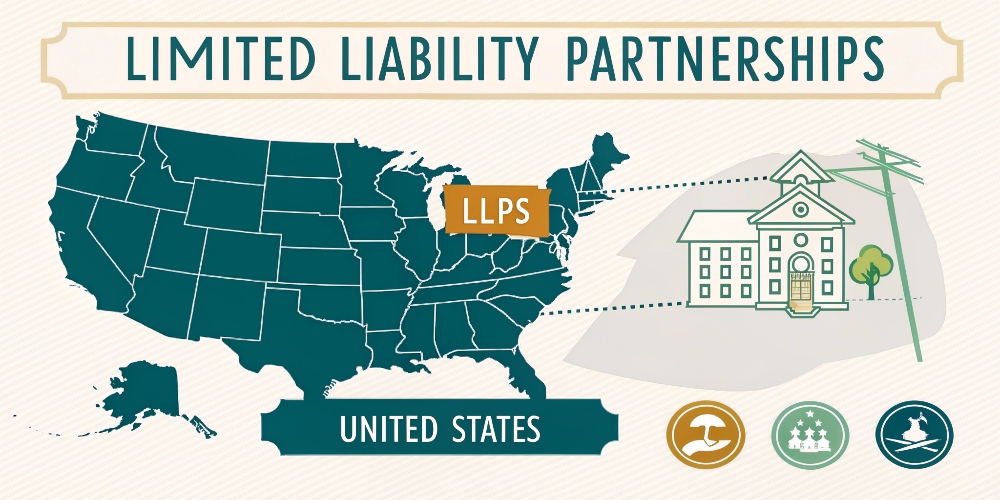A Limited Liability Partnership (LLP) is a unique hybrid business structure that combines elements of both partnerships and corporations. In an LLP, individual partners enjoy limited liability for the debts and obligations of the business, meaning they are typically not held personally responsible for the negligence or misconduct of other partners. This makes LLPs an attractive option for professionals like lawyers, doctors, accountants, and architects who seek to share resources without risking personal assets.
The LLP model originated from the need to offer legal protection to partners while still preserving the flexibility of a traditional partnership. The structure allows for pass-through taxation and avoids the double taxation typically faced by corporations. Over the years, the LLP model has been adopted by many states across the U.S., each with its own variations and regulations.
LLCs and LLPs both offer personal liability protection. In an LLC, your personal assets are protected from business debts and lawsuits. In an LLP, you are protected from your partner’s mistakes, but you are still responsible for your own actions and general business debts.
LLP Laws in the United States
The concept of LLPs in the United States gained momentum in the early 1990s as a response to growing liability concerns within professional partnerships. One of the first states to enact LLP legislation was Texas, driven by high-profile lawsuits that exposed partners to enormous personal liability. The structure was seen as a solution that maintained the collaborative nature of partnerships while shielding innocent partners from financial ruin due to a colleague’s missteps.
Following Texas’ lead, other states quickly moved to implement similar statutes, adapting the framework to meet their jurisdictional needs. By the early 2000s, most states had introduced their own version of LLP laws. However, the requirements for formation, compliance, and the scope of liability protection still vary significantly from one state to another.
States That Allow LLP Formation
Currently, all 50 U.S. states and the District of Columbia permit the formation of Limited Liability Partnerships. However, each state enforces its own set of regulations and compliance standards. The process to register an LLP and the operational freedoms it allows can differ, often influenced by the state’s approach to business governance.
States like California, New York, Texas, and Illinois not only allow LLP formation but also have a large number of professionals taking advantage of the structure. These states generally require registration with the Secretary of State, annual reporting, and adherence to specific naming conventions and insurance requirements. It’s essential to understand state-specific rules before setting up an LLP.
Key States with Favorable LLP Regulations
California
California allows LLPs but restricts their use to certain licensed professions such as law, public accountancy, and architecture. The state requires that LLPs file an application with the Secretary of State and maintain liability insurance or an adequate cash reserve. California’s legal climate supports professional firms that want to operate in a limited-liability capacity.
California’s regulatory framework emphasizes public protection and compliance, meaning LLPs in the state must ensure continuous transparency and ethical business conduct. Despite the stringent rules, California remains a hub for professional LLPs, particularly in large urban centers like Los Angeles and San Francisco.
New York
In New York, LLPs are also limited to professional services. The state mandates that partners must be licensed in their field and that the LLP name includes the words “Registered Limited Liability Partnership” or the abbreviation “RLLP.” Additionally, New York requires biennial statements and publication in two local newspapers to validate LLP status.
New York’s LLP laws are designed to ensure both credibility and transparency in the business community. Firms practicing law, accounting, or medicine often opt for the LLP structure to benefit from limited liability while remaining compliant with strict licensing regulations.
Texas
Texas was a pioneer in LLP legislation and remains one of the most LLP-friendly states. It allows a broad range of professions to form LLPs and provides significant liability protection. Registration involves filing a form with the Texas Secretary of State and paying a nominal fee. The state also requires annual reporting but maintains a generally business-friendly environment.
The Texas framework supports a wide range of business activities under the LLP umbrella. It’s a popular choice for entrepreneurs who want liability protection without the formalities of forming a corporation. The state’s efficient system and lower costs add to its appeal.
Illinois
Illinois permits LLPs across many professional services and requires registration with the Secretary of State. The state mandates annual renewal and fee payments, along with an emphasis on proper documentation and record-keeping. Illinois’ LLP laws are straightforward, making it a practical choice for professionals in Chicago and other metropolitan areas.
Professionals in legal, healthcare, and accounting sectors frequently opt for the LLP structure in Illinois due to its legal clarity and ease of formation. The state offers a reliable platform for partnerships looking to limit liability while maintaining control over their operations.
Registration Requirements by State
While LLPs are permitted in every state, the criteria to establish one can differ widely. Common requirements include filing a Certificate of Limited Liability Partnership, designating a registered agent, and paying state-specific fees. Some states may ask for proof of liability insurance or a minimum capital investment.
Additionally, states may impose unique naming requirements, publication obligations, or licensing conditions depending on the industry. These variations can impact how quickly and efficiently an LLP can be formed and begin operations. Therefore, consulting with a legal advisor familiar with local statutes is often essential.
Industry-Specific Rules in Different States
In several states, LLPs are restricted to specific professional fields such as law, medicine, and accounting. For instance, in Massachusetts and North Carolina, LLPs are often reserved for licensed professionals, and practitioners must meet both business and industry licensing criteria.
This targeted regulation helps maintain public trust in professional services and ensures that only qualified individuals can benefit from the liability protections an LLP provides. However, it also limits the broader use of LLPs for general business purposes in certain regions.
Tax Implications of LLPs by State
Tax treatment of LLPs generally follows a pass-through model where profits and losses flow directly to partners’ personal income tax returns, avoiding double taxation. However, state-level taxes can vary. States like California impose an annual LLP tax and a gross receipts fee, which can significantly affect profitability.
Conversely, states such as Nevada and Wyoming offer more favorable tax treatment with no personal income tax or franchise tax. These differences highlight the importance of comparing not only the legal structure but also the financial implications of forming an LLP in different jurisdictions.
Compliance and Reporting Obligations
Each state enforces ongoing compliance measures for LLPs. These often include annual or biennial reporting, fee payments, and updates to registered agent information. Non-compliance can lead to administrative dissolution, penalties, or loss of limited liability status.
Maintaining good standing with the state is essential for legal and financial protection. Many states also require LLPs to keep accurate internal records of meetings, decisions, and financial transactions, ensuring transparency and accountability.
Benefits of Forming an LLP in an LLP-Friendly State
Forming an LLP in a state with favorable regulations can offer many advantages, including simplified registration, broader professional eligibility, and more lenient tax policies. States like Texas and Illinois provide an environment that supports growth and minimizes bureaucratic hurdles.
Additionally, states with a high concentration of LLPs often have well-established support systems, including legal services, accounting firms, and consultants experienced with partnership laws. This ecosystem can be a significant advantage for new LLPs looking to establish themselves quickly and efficiently.
How to Choose the Right State for Your LLP
Choosing the right state for your LLP involves evaluating multiple factors including professional licensing rules, tax obligations, formation costs, and long-term compliance requirements. States with simple procedures and fewer restrictions often make the process more seamless.
It’s also vital to consider where your clients or customers are based. Some states may require you to register as a foreign LLP if you are operating primarily from another state. Strategic planning with legal and financial professionals can help ensure your LLP is set up in the most advantageous location.
Conclusion
Understanding which states allow LLP formation and under what conditions is crucial for anyone considering this business structure. While all 50 states and the District of Columbia permit LLPs, the rules, benefits, and limitations vary widely. Choosing the right state involves careful consideration of legal protections, tax implications, and professional licensing requirements.
By evaluating your specific business needs and comparing state regulations, you can make an informed decision that supports growth, limits liability, and aligns with your long-term objectives. Whether you’re a lawyer in New York, a consultant in Texas, or an architect in California, forming an LLP in the right state can offer both operational freedom and essential legal safeguards.
FAQS About Which US States Allow LLP
What is an LLP and how is it different from an LLC?
An LLP, or Limited Liability Partnership, is a business structure where partners have limited liability for the debts and actions of the other partners. Unlike an LLC, which can be owned by individuals or entities, LLPs are typically reserved for professional services. LLPs maintain a partnership model, where profits and losses are shared among partners. However, each partner is protected from the negligence or misconduct of others. LLCs offer more flexibility in ownership and taxation. The key difference lies in governance, liability, and eligibility.
Are LLPs allowed in all 50 states?
Yes, all 50 U.S. states and the District of Columbia allow the formation of LLPs. However, the rules and restrictions can vary significantly from state to state. Some states limit LLPs to certain professional services like law, accounting, or medicine. Others offer broader permissions for various business activities. It’s important to check each state’s Secretary of State website for up-to-date details. Legal advice is also helpful when navigating different state laws.
Which professionals typically form LLPs?
LLPs are most commonly formed by licensed professionals such as lawyers, accountants, doctors, and architects. These individuals often work in partnerships where shared resources and client referrals are common. The LLP structure allows them to collaborate while limiting liability. This protection is crucial if one partner faces legal or financial trouble. In some states, LLPs are only permitted for licensed practitioners. It’s a preferred choice for firms that require trust and shared responsibility.
What are the advantages of registering an LLP in Texas?
Texas is one of the most LLP-friendly states in the country. It offers broad eligibility for professionals and minimal restrictions on formation. The registration process is straightforward, with low fees and simple reporting requirements. Texas also provides strong liability protections for partners. With a business-friendly tax structure, it attracts many entrepreneurs. The supportive legal environment makes it ideal for starting and growing an LLP.
Do LLPs have to pay taxes at the business level?
Generally, LLPs do not pay federal income taxes at the business level. Instead, they benefit from pass-through taxation, meaning income is reported on each partner’s personal tax return. However, some states impose specific taxes or fees on LLPs. For example, California charges an annual LLP tax and possibly a gross receipts fee. Tax treatment can vary depending on where the LLP is registered. Consulting with a tax professional is always a wise move.
Can an LLP operate in multiple states?
Yes, an LLP can operate in more than one state, but it must register as a foreign LLP in each additional state. This involves submitting a separate application, paying additional fees, and adhering to local regulations. Each state will have its own compliance and reporting rules. Operating across state lines requires careful legal planning. Failing to register properly can result in fines or loss of legal protections. Proper documentation ensures smooth expansion.
How do I register an LLP in my state?
To register an LLP, you typically file a Certificate of Limited Liability Partnership with your state’s Secretary of State. You’ll also need to choose a business name that complies with naming rules and designate a registered agent. Some states require proof of liability insurance or publication of a legal notice. After approval, you must meet annual or biennial reporting requirements. Fees and documentation vary by state. Legal consultation can help avoid delays or rejection.
Are there states that are not ideal for LLP formation?
Yes, while all states allow LLPs, some are less favorable due to restrictive laws or high fees. For instance, California allows LLPs only for certain licensed professions and imposes extra taxes. New York has strict naming and publication requirements. States with complex compliance rules can make it difficult for new firms to thrive. It’s important to weigh costs, flexibility, and liability protections. A business-friendly state can ease operations and cut expenses.
What ongoing requirements must LLPs meet?
Most states require LLPs to file annual or biennial reports, pay renewal fees, and maintain up-to-date records. Some states also mandate minimum liability insurance coverage. Changes to partners, addresses, or business activities must be reported. Failing to comply may result in administrative dissolution. LLPs must also follow tax filing obligations at the state and federal levels. Staying compliant ensures legal protection and avoids financial penalties.
Can a non-professional or general business start an LLP?
In many states, LLPs are reserved for licensed professionals such as attorneys or accountants. However, a few states allow broader use of LLPs for general business activities. This means that even consultants, marketers, or tech firms may be eligible. The key is understanding your state’s specific regulations and definitions. Some states have no professional limitation at all. Always check eligibility requirements before choosing the LLP structure.































